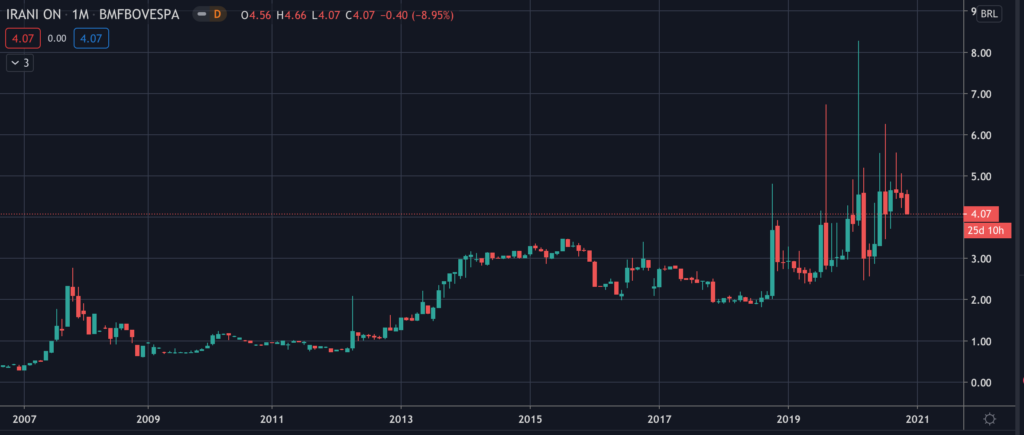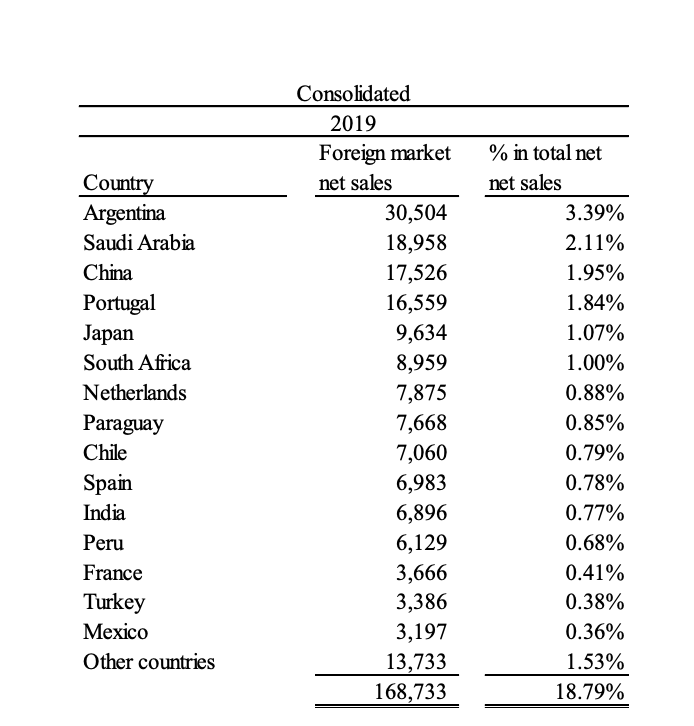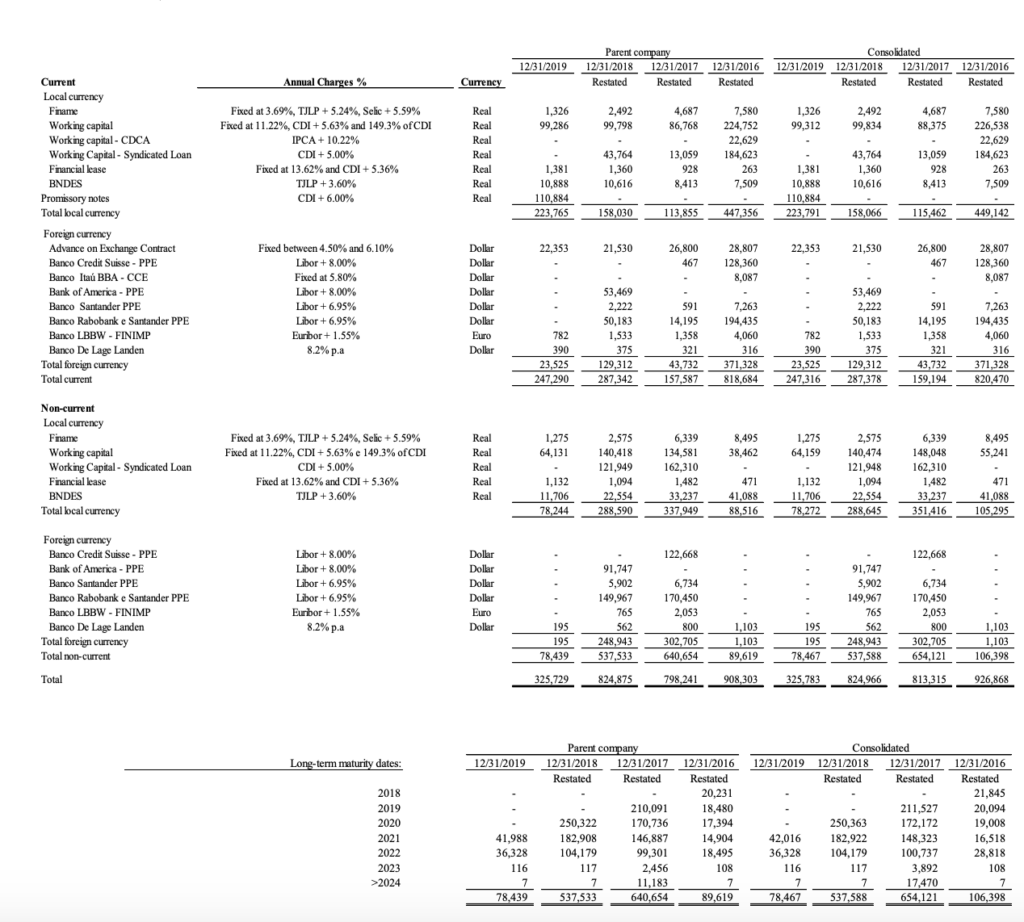Common Stock: Irani Papel (RANI3)
Current Market Price: R$ 4.07
Market Capitalization: R$ 1.1 billion
*All values in this article are expressed in Brazilian Reais (BRL) unless otherwise noted.
**The bulk of this analysis is based on the company’s most recent audited financial report, which can be found by following this link.

Irani Papel Stock – Summary of the Company
Irani Papel is Brazilian paper company. They manufacturer cardboard packaging, packaging paper, resin products, as well as its byproducts. The company sells their product throughout Brazil and exports to over 15 countries. Irani was founded in 1941 and is headquartered in Porto Alegre, Brazil. They currently have around 2,200 employees.

Revenue and Cost Analysis
In 2019 Irani had revenue of R$ 898.7 million, a significant increase from R$ 799 million in 2018. Their COGS was R$ 638 million in 2019, representing a gross margin of 29%, a slight decrease from a gross margin of 33% in 2018.
Irani had net income from continuing operations of R$ 26.4 million in 2019, representing a profit margin of 2.9%, a slight decrease from a net income and profit margin of R$ 27.2 million and 3.4% in 2018. However when you consider the company’s discontinued operation, Irani had a net loss in both years of R$ 79.5 million and R$ 223 thousand in 2019 and 2018 respectively.
Balance Sheet Analysis
The company has a leveraged balance sheet. They have sufficient liquidity in the short term, but have a high level of liabilities, including debt.
Irani Papel – Debt Analysis
As of year-end 2019 Irani has total loans and financing outstanding of R$ 325.7 million, R$ 247.3 million of which is classified as current. A significant portion of this debt, R$ 102 million, is denominated in foreign currency, mainly the US dollar and the Euro.
The company also issued additional debentures in 2019 with a total value of R$ 512.5 million, R$ 182 million of which is classified as current.

Irani Papel Stock – Share Dynamics and Capital Structure
As of July 2020 Irani has 243.9 million common shares outstanding and 12.8 million preferred shares outstanding. Total shares outstanding is around 256.7 million shares. Around 58% of the company’s shares are held by holding companies with the remaining 42% being held by smaller shareholders with less than a 5% ownership stake.

Irani Papel Stock – Dividends
The company did not pay a dividend based on 2019’s results. It paid out a small dividend based on its restated 2018 results after discontinuing a portion of its operation.
Irani Papel Stock – 3 Metrics to Consider
Debt to Equity Ratio
Total Liabilities/Total Share Holder Equity
R$ 1.2 billion / R$ 336.4 million = 3.7
A debt to equity ratio of 3.7 indicates that Irani uses a significant amount of leverage in its capital structure and relies heavily on debt financing to fund itself.
Working Capital Ratio
Current Assets/Current Liabilities
R$ 503.8 million / R$ 430.5 million = 1.1
A working capital ratio of 1.1 indicates a sufficient but not strong liquidity position. Irani should not have problems meeting its near term obligations.
Price to Book Ratio
Current Share Price/Book Value per Share.
R$ 4.07 / R$ 1.31 = 3.1
Based on total shares outstanding Irani has a book value per share of R$ 1.31. At the current market price this implies a price to book ratio of 3.1, meaning the company’s stock currently trades at a premium to the book value of the company.
Irani Papel Stock – Summary and Conclusions
Irani Papel is a decent company. They have a long history of operating in Brazil and a relevant portion of their income is from exports. After discontinuing a portion of their operations they appear to be profitable.
However despite their improving finances from discontinuing a portion of their operation, Irani is still overleveraged. They have significant debt outstanding, including US dollar denominated debt, exposing them to the negative effects of a depreciating Brazilian Real. For this reason I am not willing to invest in Irani Papel stock at this time. I will revisit the company to see how its debt issues evolve and how it preforms now that its operations are leaner. I will compare Irani Papel stock to other similar Brazilian companies, such as Battistella.
Disclaimer
This is not investment advice. Nothing in this analysis should be construed as a recommendation to buy, sell, or otherwise take action related to the security discussed. If I own a position in the security discussed, I will clearly state it.
This is not intended to be a comprehensive analysis and you should not make an investment decision based solely on the information in this analysis. I hope this serves as a useful starting point for a more comprehensive analysis, and hopefully draws attention to aspects of the company that were overlooked or merit further investigation. This is by no means intended to be a complete analysis. Again, this is not investment advice, do your own research.